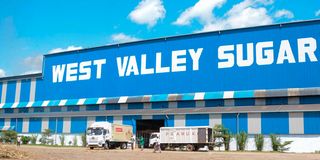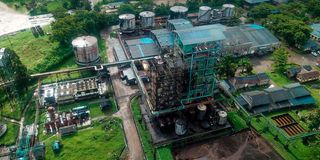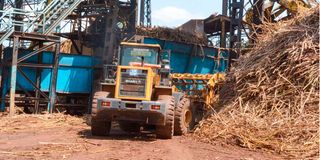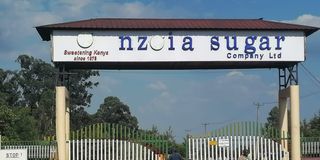
From left: Chairman of West Kenya Sugar Jaswant Singh Rai, Alfred Soi, the chairperson of West Valley Sugar, and Kibos Sugar and Allied Company Chairman Raju Chanan.
The short-cut to West Valley Sugar Company is a dilapidated road through Muhoroni Sugar Company’s vast nucleus estate.
Although Muhoroni and West Valley are in different counties —the former is in Kisumu and the latter in Kericho — the distance between them, a drive of 31 minutes, is perhaps the shortest of any two close rival sugar millers in the country.
And for the owners of West Valley, this distance is perhaps the shortest path to their newfound status as the new sugar barons.
The ride through the expanse of Muhoroni's cane-field is not a joyous one. Our driver is forced to simultaneously duck on-coming trucks carrying molasses or cane and the huge pot holes.

West Valley Sugar Company in Kericho County.
As soon as you take the corner towards West Valley factory, the road gets smoother, the land hilly and the air chilly. The large cane field melt into several tiny maize farms. The maize farms are occasionally interspersed with sugar farms.
After a drive of five minutes, a bluish mabati structure can be seen peeping above the stretch of greenness. That is the West Valley Sugar factory. Behind it is a scenic natural canvas of hills majestically rising towards the clear afternoon skies.
Way before we hear the roar of cranes, we detect a trail of smoke coming from the structure. The smoke looks white from far, but as we get closer its hue darkens.
On the way, we pass one prime mover carrying cane. Then two, three, four, five… until we can’t keep count of the prime movers any more.
Rags-to-riches story
Just outside the gate is a spectacle of irony — a maize plantation in front of a sugar factory. This is unique to West Valley, a clear indicator that the few cane growers here are recent converts.
Nonetheless, the cane yard here is constantly being replenished with fresh cane. Clearly, most of this cane would have gone to Muhoroni Sugar, but the State miller, which had been under receivership before it was leased out to West Valley, is on its knees.
As we get closer, the smoke turns greyish-white.
Although West Valley is among the youngest miller, it is earnestly milling while its neighbouring giant, Muhoroni, is eerily silent as technicians hired by West Valley try to fire up machines that have gone for years without maintenance.

An aerial view of Muhoroni Sugar Factory on July 1, 2025.
However, inside West Valley factory, the juice is clinically extracted from the cane leaving behind a residue of fibre, or bagasse, which is then pushed into the two boilers where it will be melted at very high temperatures and used to generate electricity to power the entire plant, including the crystallisation of sugar.
“All this is happening round-the-clock,” Alfred Soi, the chairperson of West Valley Sugar, shouts above the roar of the mills.
West Valley was started towards the end of 2022 by the late Mzee Samuel Kipsoi Kipterer Ngetich, alias Chepsetyon, whose inspiring rags-to-riches story saw the class three drop-out feted posthumously by President William Ruto.
Chepsetyon’s business empire spans several sectors, including dozens of supermarket outlets, tea factories, a mining company and warehouses which operate under the umbrella of Kipchimchim Group of Companies.
With the entry into the sugar industry the family has opened a new window of opportunity.
Besides leasing Muhoroni Sugar company’s nucleus estate and factory for 30 years, the family is also building another sugar company in Transmara, Narok county, with a crushing capacity of 1,250 tonnes of cane per day (TCD), just like West Valley.

Alfred Soi, the chairperson of West Valley Sugar.
To Chepsetyon’s scions — Alfred Soi, Bernard Soi, Brenda Soi and Kipkirui Stanley — the short distance from their competitors is turning out to be the short cut to them earning the title of 'sugar baron' status.
Besides Chepsetyon’s children and his estate, other shareholders of West Valley include Justice Kipsang and Lenah Chesang Kiprop, who is linked to a senior parliamentary official.
Where private millers of sugar were of Asian extraction and the cane growing zones, or the sugar belt, indigenous Kenyans are increasingly getting into the business of milling this crop with the bulk of greenfield sugar factory falling within Narok, Nandi and Kericho counties.
"Basically, we are one of the locals. The industry has actually been dominated by Asians and may be government mills," said Bernard Soi, West Valley's Managing Director.
This is a major shift from the traditional cane-growing zones Kisumu, Kakamega, Bungoma, Busia, Migori and Homa Bay. Sugarcane, a coastal plant, is also being grown Kwale County.
Transmara in Narok County is fast becoming the new sugar belt. Transmara Sugar Company was incorporated in February 2005 with the directors—all of them, except the company secretary—being foreigners.
Three of the directors are from Mauritius, a sugar growing powerhouse that is also part of the Comesa with Kenya, while the other two are from France and Reunion.
The factory crashes 3,000 tonnes of cane per day (TCD) sourced from Transmara, Bomet, Kisii and parts of Kericho.
Nearly a fifth of the sugarcane delivered to 16 millers in 2023 went to Transmara, which crashed 1,058,992 tonnes of the produce that year ahead of Rai's Sukari, 919,607 tonnes, official data shows.
The Kipchimchim Group has also been attracted to Transmara and is currently building Soit Sugar Factory with a TCD of 1,250 tonnes, also expandable to 2,500.
Another sugar company being built in Transmara is Angaza Sugar Mills, associated with industrialist Hussein Sadrudin Shamji and Deep Jitendra Nagda.
Shareholders of Angata Sugar Mills include Angata Cane Growers Limited with 3 million ordinary shares. The majority owners of Angata Cane Growers include Shamji and Nagda.
Other shareholders are Savannah Crest (Kenya) Limited, which bought the 40 per cent stake in the miller by paying Sh500 million for the stake by the end of last year, said the Competition Authority of Kenya (CAK) while approving the transaction.
Registered in January 18, 2024, Savannah Crest has 100 ordinary shares shared equally between Deborah Linet Ontiri and lawyer Peter JR Okaalet.
The two are partners of Adil Arshed Khawaja, the chairperson of Safaricom and a proprietor at law firm Hamilton Harrison & Matthews.
Mr Okaalet is linked to the law firm while Ms Ontiri is Mr Khawaja’s business partner at Lusaka Real Estate Liability Partnership. She is also a shareholder of Pioneer General Insurance Limited, one of the new owners of Sidian Bank.
Mr Ravji Devji Chhabhadhia also plans to build a sugar milling plant in Transmara with a daily crashing capacity of 1,500. By the time is it is completed, Shartuka Mills will cost an estimated $8,232,000 (Sh1.06 billion).
Along Nandi Hills-Kimwani Road in Nandi County, the family of a retired army officer Brigadier Peter Kipchirchir Magut, is setting up Tiryo Sugar Mills Limited at an estimated cost of Sh357.8 million.
The plant will have a daily crashing capacity of 1,000 tonnes and include a 45 kilolitre of per day distillery.
Mr Kipchirchir was entangled in a case in which a general building contractor Mr Hirji Seyani is reported to have been paid by the government Sh133 million for land that essentially belonged to the State.
Mr Seyani is said to have bought this land from Magut in 1999. He paid Sh5 million for this land which was in Kileleshwa, Nairobi. By the time the land was being sold to Seyani, it had a government house occupied by Mr Winston Orege, a civil servant who was paying rent to the government.
Sustainable cane supply
But that is water under the bridge for Mr Magut who has now set his sights on the sweetness of the sugar billions.
In Usonga Sub County, Siaya County, Mr Devji is building a milling factory with a TCD of 1,250, expandable to 2,500, on a 18,400-hectares land. This is the Seal Sugar Factory.
However, experts have wondered whether some of these mills have been built in compliance with the law.
The Crops Act, 2013 requires that anyone seeking to start a sugar milling factory must undertake cane development as part of broader efforts to ensure sustainable cane supply and prevent predatory practices like cane poaching.
Some of the sugar barons have risen to their current heights mainly through cane poaching. Others made their billions through illegal imports of cheap sugar.
Agriculture and Food Authority (AFA), through the Sugar Directorate, requires new millers to develop sufficient cane acreage, either of its own or contracted, before it gets the license.
West Valley, did not start with a nucleus farm of its, and did not undertake any cane development by the time it was starting, though the management insists it started with 4,000 farmers and has ever since grown the number.
Its next-door neighbour, however, had for years undertaken cane development, both on its nucleus estate and the out-grower farms around it.
This has triggered a lot of speculations. One of which is that West Valley, built at the time when consensus around the privatization of ailing State-owned sugar companies was build, was just waiting in the wings.
Some critics even suggested that the smoke coming out West Valley’s chimneys was a smokescreen, noting that the company was simply importing and packaging sugar in its factory. West Valley’s management has vehemently denied these claims.
West Valley also reckons it currently has 1,000 hectares of land with 7,000 farmers for cane development.
However, this is way below the 29,914 hectares required to supply cane to one sugar milling factory.

A wheel loader gathers sugarcane at the loading yard of Sony Sugar Company Limited in Awendo, Migori County, on June 11, 2025.
Despite farmers being opposed to the four State-owned millers being leased to existing sugar companies to encourage competition, the private millers have been allowed to lease the factories and lands belong to their next-door competitors as the sugar industry comes under the grip of a few wealthy individuals with political ties.
Most of the private millers that won the leases have been accused of cane poaching by the same sugar companies they are leasing.
The liberalisation of the sugar industry in the 1990s under the Structural Adjustment Programs (SAPs) opened the sector to the involvement of private investors, some of whom took advantage of weak regulation to flood the market with cheap sugar during shortages, evade taxes and engage in flagrant cane poaching.
These individuals, mostly Asians, came to be known as sugar barons for their outsized control over supply, prices, and policy.
Saulo Busolo, the former chairperson of the Kenya Sugar Board, and a sugarcane farmer in Bungoma, reckons that it is not the invisible hand of the Market that has created Kenya's sugar barons, but the visible hand of the State.
State control, he reckons, has resulted in what is known as crony capitalism where a few, well-connected individuals accumulate wealth, sometimes at the expanse of majority of Kenyans.
"When you look at accumulation of wealth in this country, it has not been through business, it has been through State connections," said Busolo, noting that it is the State which gives permit for import of cheap sugar.
"So this control mechanism is what makes avenues of accumulation for these people," said Busolo.
One of the sugar barons that came out of the 1990s liberalisation of the sugar industry is the Rai family, which rose to dominate private milling, as State millers fell on their knees.

West Kenya Sugar Chairman Jaswant Singh Rai.
Rai Group’s West Kenya, which has leased Nzoia Sugar's factory and nucleus estate of 3,600 hectares, had for years been accused of engaging in unhealthy competition by reaping where they did not sow through cane poaching.
Cane poaching occurs when one sugar factory harvests sugarcane meant for another factory, usually because the farmer had a contract or supply agreement with that factory.
The contract is normally consummated by the miller investing in cane development by availing machinery and critical inputs such as fertilizer and seeds to the farmer. Nzoia, for example, has an out grower scheme of 26,000 hectares.
The poacher is thus reaping where he did not sow.
West Kenya’s fight with Bungoma-based Nzoia Sugar over cane poaching was brutal. West Kenya’s Naitiri and Nzoia Sugar could not see eye to eye, with the latter pointing an accusing finger on the latter for its financial woes.

The main gate at Nzoia Sugar Company in Kanduyi constituency Bungoma County.
As the poaching menace increased Nzoia Sugar became aggressive in its anti-cane poaching tactics that would occasionally turn bloody.
Now, the competition has been silenced in a bizarre fashion. Under the leadership of Jaswant Rai, the Rai family’s West Kenya will manage and operate Nzoia Sugar for the next 30 years.
The Rai family, under which there is a total of 23 companies, controls close to percent of the sugar market in the country through its various factories.
Locals are wary that this might mark the end of Nzoia Sugar brand on the shelves, as West Kenya might prioritize its own brand known as Kabras.
While West Kenya squared it out with Nzoia, Kibos Sugar & Allied Industries scrambled for the same cane farmers with Chemelil. Under the latest leasing agreement, Chemelil will be operated by Kibos for the next 30 years.

Kibos Sugar and Allied Company Chairman Raju Chanan.
Kibos is owned by the Chatthe family, which is also fighting for the 22,000-hectare land controlled by Miwani Sugar Industries, currently under receivership.
The only exception is South Nyanza Sugar Company (Sony) which has been leased to Busia Sugar Industry, associated with the family of the late Salim Ahmed Taib Bajaber, the founder of Kitui Flour Mills, which owns Dola Maize Flour.
The new lessee is eight hours’ drive away in Busia County. Busia Sugar Industry is associated with Kitui Flour. Busia Sugar Industry was founded by Ahmed Taib, its current Managing Director.
The leasing agreements might breed a second cohort of sugar barons as the 1990s and 2000s sugar barons like Rai family, Kibos Sugar & Allied Industries and Busia Sugar Industry are joined by newbies such as West Valley in the sugar industry.
But for the new breed of sugar barons, money will not come only from refined sugar.
Tomorrow: Inside Kenya’s collapsing sugar belt







